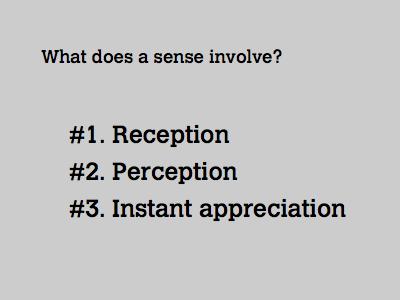
Let’s have a first try at a definition: There has to be something to receive from outside the body—the act of receiving is “reception”. What makes that become perception is the act of interpretation using already-known concepts. We add our own expectations into the mix—whether they’re learned from moments ago, or from evolutionary time, like the learned expectation that light comes from above, as with the sun.
The problem with this definition is it becomes any kind of active exploration. I could argue that “knowledge” is brought into the brain using the “sense of learning”. That’s fair enough, but it doesn’t feel right and I don’t like to stretch definitions too far.
So, second try. We’ll add the qualification that the perception has to happen mostly before consciousness and shouldn’t require any deduction. We call this “instant appreciation.” That is, our senses let us look at something and immediately perceive a whole bunch of stuff without having to consciously deduce it.
This matches my feeling better.
It also matches the next generation web browser ideas better. On the page, what information do we have to deduce, and what information is computationally extracted and munged until it can be “instantly appreciated” so we can act on it without having to deliberately understand it?